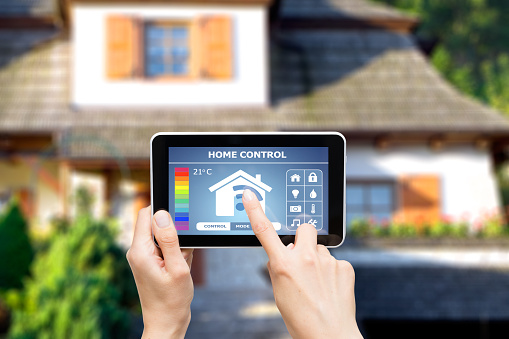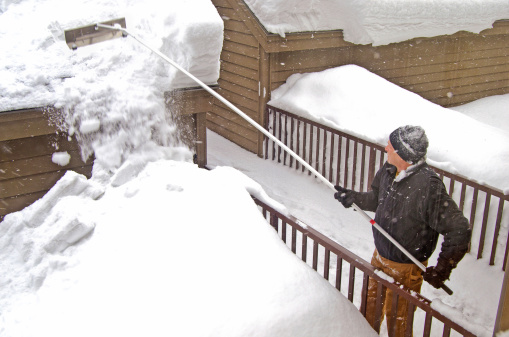Depending on the age of your home, your experience with smart home devices may have been limited so far. Smart home devices aim to improve our lives—enabling us to work smarter, not harder, and to let go of some of the mundane chores we’re all tasked with—allowing us to focus on more interesting things.
For older adults or those living with physical challenges, smart home devices can be life-changing, allowing those to hold on to their independence longer. In fact, smart home devices benefit users of all age groups, from helping grandkids with their homework to buying more time for busy millennials.
Which Home Sensors Are Most Useful for You?
With so many smart home options available, you may be unsure of where to start. Consider which of these many options could improve your home life. Perhaps it helps to separate your options into must-haves and nice-to-haves, depending on your budget. Decide whether you’re considering your own comfort at home or upgrades you’ll want to make when it’s time to sell a home.
For most people, safety and security are top of mind. A smart home security system and fire detection device are must-haves to keep your family and property safe. Smart doorbells are nice to have, especially if you get a lot of visitors or worry about package theft. While smart door locks aren’t necessary, they can also be nice to have if your budget allows.
And there are many more options: Smart thermostats are a great feature to make your home more comfortable and save on energy costs, while smart refrigerators are more of a luxury item. Investing in a smart TV can help you to cut the cord or significantly reduce your cable TV bill. Smart lighting is great to set the mood throughout your home, and also can act as a crime deterrent by making your home appear occupied with lights turning on and off at scheduled times.
Of course, none of the smart home devices that complete your household chores are truly necessities, but they certainly are nice to have for those who are terribly busy, have mobility issues, or just hate doing certain chores.
A controller, on the other hand, is necessary for the operation of many smart home devices and it also gives you the ability to connect your devices to create routines and avoid the inconvenience of using multiple apps on your phone.
Whole Home Automation
For those who want to go all in on home automation and are willing to pay for a seamless experience, consider a whole home automation solution, like Control4. This system is hardwired into your property and allows you to control virtually any device in your home or business, including lighting, music, video, security, and energy in a single room or throughout the entire home.
Your home, or the home you’re moving into, needs to have the correct wiring for the smart technology you plan on installing; otherwise, it may cost more to rewire it for compatibility. The smart home provider you’re considering can send someone to do a walk-through of your property and tell you which system is better for you—hardwired or wireless—and offer recommendations on the types of technology available to you.
The downsides of whole home automation are that it’s expensive and it isn’t easy to take with you if you decide to move; however, you may be able to recoup some of the investment when you sell.
How Does Smart Technology Impact Resale Value?
As a homeowner, you can rest assured that certain upgrades—like installing hardwood floors or adding that marble countertop—will pay off when you sell your house. You may be wondering if the same thing holds for smart home technology.
The answer is, it depends. Installing a $200 device isn’t going to suddenly up the value of your home, but if you spent $12,000 hardwiring your home for complete automation, including a smart doorbell, door locks, security system, lighting, entertainment system, thermostats, and more, there’s a good chance you’ll get some of that money back if you find a buyer who appreciates these features.
However, the smart home devices that garnered the most interest included those that provided security, privacy, cost savings, energy savings, and comfort. Therefore, if you don’t opt for whole home automation, then smart security systems, thermostats, and lighting are some of your best bets.
While adding a few smart home devices here and there may not significantly increase the monetary value of your home, it may benefit you in other ways. For instance, it could help to differentiate your home, which may lead to a faster sale. It’s important that your agent is educated on the products you’ve installed and can speak to their benefits, such as time and energy cost savings.
Smart Home Devices to Explore
Here are 15 categories of devices that have the potential to make your home a little smarter and your life a little easier.
Safety and Security
While many of the smart home devices highlighted below are for fun or convenience, those that offer safety and security features are great for peace of mind. Whether you’re at work, traveling for business, or on vacation, internet-connected security devices can help you rest easier, knowing that all is well on the home front.
- Fire Detection Devices
Did you know that nearly three out of every five home fire deaths result from fires in properties without working smoke alarms, according to the National Fire Protection Association?
While your standard old-school smoke detector is still a great tool in preventing injury and death, it will only alert you to problems if you’re at home. Today’s internet-connected smoke and fire detection devices can alert you anywhere—via your smartphone—facilitating a faster call to emergency services when you’re away, and potentially saving the lives of loved ones and preventing property damage.
Examples: Nest Protect; First Alert Wireless Smoke Alarm with IRIS; Roost Smart Battery (to give any smoke detector the ability to alert you about possible fire situations remotely).
- Water Detection Devices
Anyone who’s suffered through a burst pipe, water heater, or dishwasher disaster in their home knows the importance of early detection. A smart water sensor can alert you, via your smartphone, as soon as water is detected, prompting you to drop whatever you’re doing, get back home, and call the plumber to meet you there, potentially saving you time, money, and frustration.
Examples: D-Link Wi-Fi Water Sensor; FIBARO Flood Sensor; Aeon Labs Aeotec Water Sensor.
- Doorbell Cameras
Imagine being able to answer your door from anywhere. Not only is this extremely convenient for those with limited mobility, but also it’s much safer when you have a stranger at your door. This is why smart doorbells have become increasingly popular over the years. They will notify you in the case of an unexpected visitor or package delivery, which can prevent burglary and property loss, while also recording the identity of those involved.
Examples: Ring Video Doorbell; SkyBell; Vivint Doorbell Camera.
- Home Security Systems
The Internet of Things has made it easy and relatively affordable to monitor your home from just about anywhere with a smart security system. Depending on your needs, you can go with a system that you monitor yourself, or pay a subscription fee to have your home surveilled 24/7 by professionals who will contact your local fire and police departments when alarms are triggered.
Examples: SimpliSafe; ADT Pulse; Vivint Smart Home.
- Door Locks
Smart locks allow you to lock and unlock your door remotely—whether you’re at home or away—and even provide codes to friends, family, caregivers, house cleaners, dog walkers, and anyone else you frequently allow into your home.
Think of those times when your hands are full of shopping bags, your dog’s leash, or any other item that makes it difficult to dig around for your keys. Or when you’ve crawled into your warm bed at night only to wonder whether you remembered to lock the door; with a smart lock, you can simply check the status on your phone from wherever you are.
Examples: August Smart Lock; Nest X Yale Lock With Nest Connect; Schlage Sense.
Appliances and Lighting
Here’s where you really can turn your house into a home. Smart appliances and lighting give you the ability to customize your home experience, making it feel just right for you, from the brightness of the lights to the temperature of the room.
- Refrigerators
While smart refrigerators are far from a necessity, they are quite convenient. Many will keep an inventory of your food, reducing the chance of your buying duplicate items, thereby saving you money. Some also can keep track of expiration dates and tell you when something has gone bad, just in case your sniffer isn’t quite sure.
Your grocery lists receive updates in real time and sync to your smartphone, letting you know exactly what you need while you’re still at the grocery store.
Examples: LG Model Number LSXS26396S; Cafe Model Number CFE28USHSS.
- Smart TVs
A 2023 study by Hub Research found that 74% of homes now have at least one smart TV, up from 61% in 2020. Smart TVs are so popular because they are easy to use and enable you to stream TV and movies, browse the web, access games and apps, enjoy social media, and more. They give you access not only to top-tier services like Netflix, Hulu, and Amazon Video, but also to the various digital TV catch-up services available.
Examples: Android TV; Roku TV; Amazon Fire TV.
- Lighting
There are a few different ways to make your lights smart. You can replace the switches, use smart plugs to switch the power on and off, or you can simply make the bulbs smart with no electrician, DIY, or coding skills required.
When connected to an appropriate app or home automation hub, smart bulbs have features that include changing the color of your lights from day to night (or to set the mood for a party), as well as the ability to automate when your lights turn off and on.
Examples: Philips Hue; LIFX; C by GE.
- Thermostats
Smart thermostats are not only convenient but also can save you money by making your home more energy efficient. They can turn the heat or A/C off when no one’s home and turn it back on when you pull in the driveway or at any designated time. Some can even distinguish between users, turning it to a specific setting when certain members of the family enter a room.
Examples: Nest Smart Thermostat; ecobee; Honeywell Lyric.
Household Chores
If it feels like you have a never-ending to-do list, it may be time to let go of the reigns a little and automate a few of your tasks. Smart home devices can take care of the little things, like turning on the sprinklers, cleaning the floors, and feeding the cat, while you handle the fun stuff.
- Automated Sprinklers
An internet connection can take your standard automated sprinkler system to the next level. For most people with an in-ground sprinkler system, a smart controller will save water and money compared to a basic timer. Some can respond to real-time weather conditions, offer customizable watering schedules, and give you control of your sprinkler system from anywhere in the world via an app on your smartphone.
Examples: Rachio; Orbit B-hyve; Skydrop.
- Robot Vacuums
Want a tidy home without spending time doing the work? Robot vacuums can help you dispose of dirt, dust, pet hair, and other debris on your bare or carpeted floors without lifting a finger or straining your back. You simply set them loose and forget about it. Many will find their way back to their charging station and recharge themselves, while others can be programmed to clean at a specific time each day.
Examples: iRobot Roomba; eufy RoboVac; SAMSUNG POWERbot.
- Window Blinds
There’s nothing like natural light to brighten up your home. Unfortunately, depending on how many windows you have, manually opening the shades each morning and drawing them back down each night may be a pain. That’s where smart shade solutions come in. Motorized shades can be commanded to go up or down to suit your fancy, without having to pull any strings.
Examples: Lutron Shades; SOMA Smart Shades; Somfy blinds.
- Pet Feeders
Have you ever run out the door and then realized you forgot to feed your beloved pet? Now, Fido or your faithful felines won’t have to suffer until you get back home. Smart pet feeders can dish out the exact portion of food designated for your furry friend at the exact time you determine. With access to your home Wi-Fi connection, some smart feeders also provide built-in webcam and speaker functionality.
Examples: Petnet SmartFeeder; PetSafe Smart Feed Automatic Dog and Cat Feeder; Petcube.
Controllers
The more smart home devices you have, the more likely you’ll need a centralized method to control them all; otherwise, you could end up spending all day fidgeting with a half dozen apps on your smartphone. The point of all this is to make your life easier, not harder, so a controller is key.
- Hubs
Smart home hubs can connect all your devices to the cloud and give you one app that acts as a universal remote. However, it’s important to make sure the hub you choose is compatible with your various smart devices before purchasing.
Additionally, hubs can provide the ability to automate your devices. For example, when you unlock your door, the lights in your entryway automatically turn on, and your thermostat is already set to the temperature you like. Home sweet home, indeed.
Examples: Samsung SmartThings; Wink; Google Home Hub.
- Voice Assistants
When it comes to controlling your smart home devices, everything is typically done through the use of an app—or multiple apps—on your smartphone. Unless you incorporate a voice assistant. These helpers allow you to go completely hands-free, using only voice commands to make things happen in your home. Thanks, Alexa!
You can simply tell the voice assistant to turn on the lights, set your thermostat to a certain temperature, or change your smart TV to a specific channel, without moving from that comfy spot on your sofa.
Examples: Amazon’s Alexa; Google Home; Apple Home Kit.
The Smart Home Is Becoming the New Normal
While the Starship Enterprise-like smart home dream—where everything just miraculously responds to your every command without your having to lift a finger—is still a far-off fantasy, we’re getting a little closer every day.
Many of these smart devices are extremely user-friendly, requiring no professional help for installation. Those who are fairly tech savvy can easily get them up and running, while those who aren’t can ask for a bit of help. After installing some of these smart home features, you may wonder how you ever functioned without them







I do NOT want paperless billing.
This information is important for seniors and should be mailed, in a pamphlet form. I would use it as a check list when I move and having the names of the mfr. Is extremely useful.
Somewhat interesting, however, it over complicates the issue. Most of the items you feature are more toys than helpful.
I have over 90 smart devices in my home. The overwhelming majority are lighting related. Every light in my house is a smart one. I have nine smart speakers throughout the house so I can control any device from anyplace on my property.
The real advantage is to set routines that provide several actions from one command.
For example, when I wake up in the morning, I ask the speaker by my bed what time it is. If it’s four am or later, I tell it to “wake up.” The system then turns on my bedside light, the hallway lights the lights in my kitchen, den, living room and strip lights on both porches and turns on my coffee maker.
I come downstairs to a lighted environment and my coffee is ready to pour.
Another is in the evening when I say “it’s getting dark” and the system turns on a number of lights and turns on the supplemental heat or air conditioning in my bedroom.
I have several other routines in the system that are useful.
I also can issue group commands, such as when I go to my basement and tell the speaker to turn on the basement lights and four lights come on.
Lighting and a few auxiliary devices are the most useful devices to have in a smart home.
Your blog about smart home is amazing. It is filled with rich info. Thanks a lot for sharing such a wonderful blog.
You’re welcome, Ethan! Thank you for commenting!
Your blog about You and Your Smart Home: 15 Gadgets and Why You Should Care is an amazing blog. It is filled with rich info. Thanks a lot for sharing such a wonderful blog.
This is the automated window blinds mentioned in the article, SOMA Smart shades. They’re pretty cool, and they can work with your existing blinds. And the price is quite reasonable comparing to another offers
https://www.somasmarthome.com/
Wonderful information, thanks a lot for sharing kind of content with us. Your blog gives the best and the most interesting information. I wonder if we can gather such practical information on gadget to make home smarter. Great one!! Well, I have visited another site Mcwe.co.nz having some wonderful and similar information.
I really like all the points you have made here.
There’s certainly a lot to learn about this subject.
An interesting discussion is worth comment. I do believe that you should write more on this topic, it might not become a taboo subject but typically persons are inadequate to communicate in on such topics. Yet another. Cheers
I have realized that car insurance companies know the autos which are at risk from accidents along with risks. In addition, they know what sort of cars are inclined to higher risk as well as higher risk they may have the higher your premium amount. Understanding the uncomplicated basics associated with car insurance will assist you to choose the right style of insurance policy that can take care of your preferences in case you get involved in an accident. Many thanks for sharing the ideas in your blog.
Thanks for the excellent content. Wish to see even more shortly. Thanks again and keep up the great work!
Hi, Very Nice Article. Here is a list of the most essential Smart Home Sensors that are a must in any smart home today. In this, we compare & evaluate which home sensors are most useful for you. Also, you will get to know about Smartest home automation device which integrates these Home Automation Sensors.